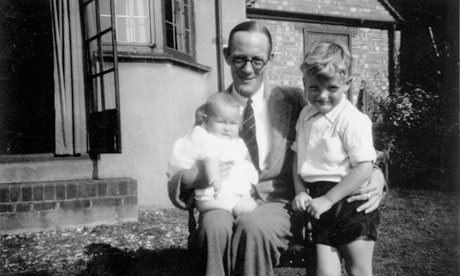
Towards the end of this beautifully written book, Michael Frayn remembers a letter his father, Tom, sent him a few months before he died. He had just undergone an operation to remove a cancerous tumour from his bladder and writes to thank his son for his visits to the hospital that, on many occasions, "seemed the mainstay of my existence".
Frayn, recalling this missive some 40 years later in this biography, finds that he is "so moved by what he says… I find it difficult even to copy it here". His relationship with his father, while deeply affectionate, was one of dignified restraint, the product of an era before the easy, expressive intimacy of subsequent generations. It was, says Frayn, the first time that his father had "opened his heart, and spoken as we should all like to speak". Frayn, for reasons he still does not fully understand, never replied to the letter or referred to it in conversation. The failure to do so, he admits, continues "to baffle and shame" him.
But with this slim, moving memoir, Frayn has finally managed to respond to the father he so clearly loved. He does so with immense panache, writing in a way that evokes emotion without ever lapsing into bathos, threading sentences through with a gentle, touching humour.
So it is that we learn of Tom Frayn, a quick-witted boy born into impoverished circumstances, the youngest of four siblings, all of whom suffered from hereditary deafness. He marries his childhood sweetheart Violet and becomes a travelling salesman, exempt from war service in 1939 because of his "reserved occupation" selling fireproof asbestos to government departments. The couple have two children and settle down in suburban contentment in the village of Ewell in Surrey.
Tom Frayn's life is not particularly exceptional and therein lies its charm – the story reflects the experiences of any number of men and women; that it is told so well is testament to his son's talent.
Throughout a five-decade career that has spanned almost every possible literary form – plays (Noises Off, Copenhagen), novels (Spies, Headlong and the Fleet Street classic Towards the End of the Morning), journalism, screenplays, translations and works of philosophy – Frayn has never before dipped his toe into the waters of autobiography. And yet the memoir is perfectly suited to his combined talents. My Father's Fortune shows him at his very best. He expresses in a few words what it would take other writers several paragraphs to convey. His father's features "are as neat and well-ordered as his three-piece suit and polished toecaps". His uncle Sid is "balding in a responsible kind of way".
And of course he is also extremely funny, possessing a quietly ironic tone that is pleasantly teasing and often self-mocking. He recalls his adolescent ambition to be a Romantic poet with dismissive sarcasm. "I'm going to be a poet hidden in the light of thought," he writes. "I shall even break up the lines, though it will be another year or more before I discover the existence of metre." One of his early efforts at emulating his hero, Shelley, is described as "relatively terse, a mere 216 lines".
Such is the ease and fluidity of Frayn's prose that when, in the middle of the memoir, his mother dies without warning of a heart attack at the age of 41, the shock is jolting. Frayn is 12 years old; his sister is eight and their mother is never spoken of in their house again. "One of the reasons that my sister and I never mentioned her is that we lacked the words," Frayn writes. "We had a name for her when she was alive, of course… Somehow, though, we could no longer say the word. I'm not sure I can even now, even to myself. I'm not sure I can write it down."
And then: "Yes. She was Mummy. It was Mummy who had died.
"There – done. For the first time in 64 years."
It is one of the most moving passages in the book. In the end, Frayn has written a letter of love not just to his father, but to his mother too.

